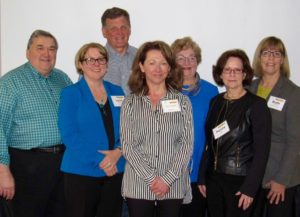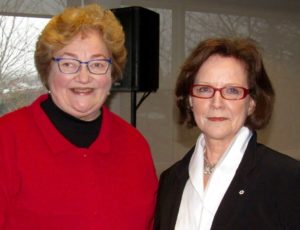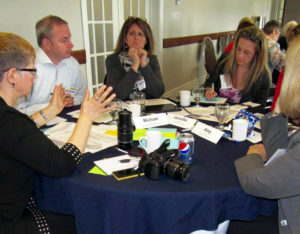|
Getting your Trinity Audio player ready...
|
For somebody trying to get a good thing going, the circumstances might have been intimidating.
Top leaders of well-established, battle-hardened agencies meeting to talk about hefty issues, such as board governance and risk-management. What could a nascent organization possibly get out of rubbing elbows with company of this calibre?
Plenty.

“We really saw this as a great opportunity because a lot of the organizations that were there had been around for awhile,” Jennifer Tipple said of the Board Governance BootCamp Capacity held in St. John’s earlier in May. “They were looking at ways to make their existing boards better, whereas we are looking at taking best practices and models so we can do it right the first time.”
Tipple belongs to a committee involved in the creation of a new agency, the Home Again Furniture Bank. Home Again collects and distributes furniture to people in need. It’s so new it doesn’t have a board yet.
The Anglican Diocese of Newfoundland and Labrador currently looks after the project. Home Again is in “beta mode,” Tipple said.
For her, the timing of the BootCamp couldn’t have been better.
“We’re building the model and laying the foundation for what we want to be when we grow up, ” Tipple said.
Capacity has hosted Governance BootCamps in Waterloo Region, Ont. for several years to strengthen non-profit agencies in the charitable sector by helping boards and administrations understand their respective roles.

Last November, Capacity partnered with FuseSocial to hold a Governance BootCamp in Fort McMurray, Alta. In St. John’s, the co-host May 5-7 was Community Sector Council Newfoundland and Labrador, (CSC-NL). Almost two dozen people from 13 organizations took part.
BootCamp participants always leave with a homework assignment: they apply what they learn on the weekend to a real challenge in their respective organizations. The St. John’s group reconvenes Oct. 19 to report on their assignments and graduate.
It is an extraordinary collection of leaders, said Cathy Brothers, Capacity’s chief executive officer. While they were there to improve their knowledge on governance, participants also brought a lot of experience to the table, she said. What they shared will find its way into the content of other Capacity BootCamps.
“When you teach people at that level, you get greater satisfaction as you see them inspired to move the bar even higher,” Brothers said.
The BootCamp brought in regular and occasional faculty: governance experts Don McCreesh and Fred Galloway; Ruth Cruikshank of the Lazaridis School of Business and Economics, Wilfrid Laurier University; and Lynn Randall, who leads Capacity’s National Capacity Building Strategy in partnership with the Suncor Energy Foundation.
Participants heard three cases studies: one on an organization that pulled itself from the edge of bankruptcy; another on the succession planning that went into replacing a long-serving, highly respected executive director; and a third on how one board shifted from an operational model to a governance model.
Newfoundland-born Carol Leaman, who is the executive director of Axonify, a technology company in Waterloo, Ont., spoke to the group about the critical importance of boards. In the policies they shape and the decisions they make, boards establish the culture of organizations, Leaman said. Board recruitment, then, should be planned and thoughtful if organizations want to be innovative.
“BootCamps won’t solve many problems over one weekend, but they whet the appetite for deeper digging into the issues raised,” said Penny Rowe, who co-hosted the St. John’s event with Brothers.
Rowe, the executive director of CSC-NL, said big take-aways from the BootCamp include assessing and managing risk (so that organizations feel confident about heading in new directions); and encouraging board members to feel comfortable about being more strategic, generative participants in their organizations.
“People genuinely want to be better at what they are doing, and they take pleasure in what they are doing well,” Rowe said. “They are eager to build their ability — the techniques — to get there.”
The trick is pacing.
Angela Crockwell, executive director of Thrive Community Youth Network St. John’s, says some of the ideas coming out of the BootCamp can be applied sooner than later. It shouldn’t be difficult, for example, to build in a regular review of an organization’s letters patent and bylaws, or shift board agenda responsibilities from the executive director to the board.

Other items deserve more thought and may take a couple of years to achieve. After the BootCamp, Crockwell drew up a to-do list.
“If we radically change and say, ‘Let’s do all this now,’ it won’t get done,” she said. “We want to figure out board recruitment. We want to figure out risk management. We want to figure out succession planning — all those things. We’re probably 60-70 per cent there, but it would be nice to be 85.”
The Home Again Furniture Bank is also working through a to-do list. As it makes its way toward becoming a not-for-profit agency, Home Again has to complete a business plan, think about fundraising and build a volunteer base — among other things.
It can check off one item at least — lessons in good governance.
“You don’t know what you don’t know until somebody sits down and tells you, ‘Here are the aspects of a board you should consider,’ “ Tipple said. “Here are best practices used by organizations, here are best practices used by not-for-profits.
“It was good to sit in a room with other organizations, learn about their challenges, and talk about how we can work together.”

